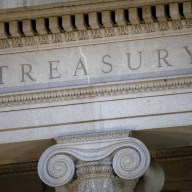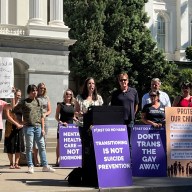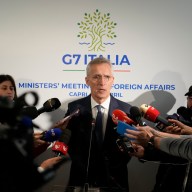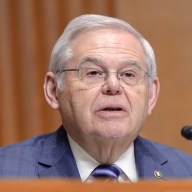Israel is attacking Gaza again. Syria is descending into civil war. This fall four American diplomats were killed in Libya. The Middle East is more fragile than ever.
Israel’s leaders don’t want a Palestinian state, Jimmy Carter tells Metro in an exclusive interview. The former US President, who still conducts international negotiations and is now a member The Elders, won the 2002 Nobel Peace Prize. He just returned from the Middle East.
METRO: The chances of a Palestinian state are fading. Whose job is it to fix this situation?
CARTER: The first priority would be for the Israelis and Palestinians to take the initiative. But the Israelis have continued with their massive settlement program in the West Bank and East Jerusalem, and the Palestinians say they won’t negotiate as long as Israel is continuing to take over their territory, so there’s deadlock. The United States is looked upon by the rest of the international community as the primary interlocutor, so the European Union members don’t take action. As a result, there’s no intermediary who can move things forward and initiate peace talks.
President Obama says he supports a Palestinian state, but even so there’s a deadlock. Does it take even more than the support of a US President to get a Palestinian state?
I think the big change is that the Israeli leaders have decided to abandon the two-state solution. Their policy now is to confiscate Palestinian territory, and they’ve announced publicly that it the Palestinians have to recognize not just Israel but Israel as a Jewish state, even though 20% of the Israeli community are non-Jews. [Israeli Prime Minister Benjamin] Netanyahu has also decided that even the Jordan valley has to be under Israeli control. So, those factors indicate quite clearly that Netanyahu has decided that the two-state solution is not what he wants. He wants what is being called Greater Israel, Eretz Israel.
The Arab Spring had worldwide support. Now four diplomats have been killed and the region is considered less safe. Are dictators sometimes better than democracy?
I don’t think so at all. For example, the Egyptian people had a very safe series of elections. As the Carter Center, we’ve been here for several of these elections, and have also monitored the elections in Tunisia and Libya. I don’t think there’s any doubt that the termination of the dictators has been a major beneficial development. The outside world just tends to be too impatient. The United States declared our independence from Britain in 1776, and it wasn’t until 12 years later that we had a constitution. Egypt is going to have a constitution within a year of the President assuming power.
So we’re simply too worried about Islamists?
Look at the Muslim Brotherhood. I’ve known the Muslim Brotherhood leaders for 20 years. They were persecuted by the Mubarak government, imprisoned and so forth, and now they’ve gone to the people in an honest, fair and safe election. And, of course, they’ve prevailed because their candidate became President and they have a majority in Parliament. But they’re a very moderate group of Islamists, whereas salafists and others are much more radical, at least judging with Western criteria.
The YouTube video defaming Islam caused attacks and huge protests in the Arab world, including possibly the killing American diplomats in Libya. Who’s to blame? Is there too much freedom of speech in the US, or are Muslims too sensitive?
First of all, all the evidence now shows that the killings of the four American diplomats in Libya weren’t caused by the film but was instead a planned attack by al Qaeda. In the US, Britain, Norway, Sweden and other countries in the West we believe in the right of expression. Western leaders are often criticized in scandalous ways in paintings, words and sculptures, and that criticism is accepted as legitimate. But we deplore when there’s a scandalous statement like the ones made in that YouTube film. We regret that it has caused pain to believers in the Islamic faith, but it happens to our own faith as well. But freedom of speech includes freedom of blasphemy.
But isn’t it frightening in itself that a deranged YouTube video posted by an obscure individual can undo years of diplomacy?
Yes, it is frightening. I’m a Christian; I teach Bible school every Sunday. I’ve heard and seen statements made about my own faith that cause me pain. But I don’t want the blasphemous person who made the statements put in jail. Yes, it’s painful to see the reaction in the Arab world, but I think we have to anticipate it. People in the non-Muslim world who deliberately do this in order to cause Muslims pain underestimate the violence that can erupt from aggrieved Muslims. It’s painful and unfortunate, but when you have to choose between that kind of pain and the right of freedom to voice your opinions we come down on the side of freedom.
Carter facts
Family:
Background: Governor of Georgia. President of the United States 1976-1980. Nobel Peace Prize Winner 2002
In the news: Members of The Elders, peace negotiator. Heads the Carter Center, which monitors democracy and elections. Recently returned from the Middle East
Interesting fact: Devout Evangelical Christian; still teaches Sunday school every week.
















